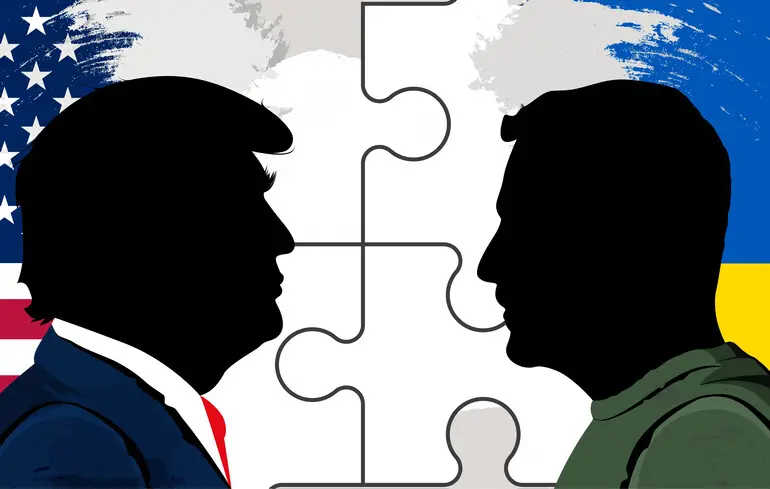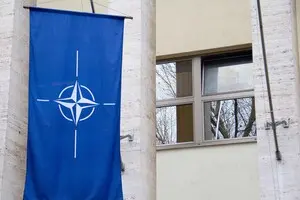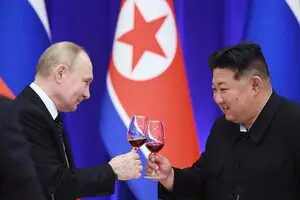How To Help Ukraine Stop Russia And Why It’s In Trump’s Best Interest
Expressed as early as the 1970s, the idea of a diminishing US leadership is now increasingly borne out by facts. After an array of failures – the global war on terror, Iraq, Syria, Libya and Afghanistan – Washington seems to lack the confidence of the world’s sole superpower. The rules-based international order that has existed since the end of World War II abounds with dividing lines and is criticized by the Global South, whereas adversaries of the West pose mounting dangers that can hardly be dealt with a snap of one’s fingers. Against this background, Russia’s war against Ukraine at its present stage is not so much a chance to reverse the trend as a sign of frailty of the US, the EU and Western-led security institutions and norms as a whole.
This assessment sure will raise some eyebrows. NATO has just admitted two new member states, the EU is implementing its own industrial defense strategy and Washington is forging new security partnerships, with the Japanese prime minister and US ambassador to Japan even speaking of an equivalent of NATO in Asia. Russia is making territorial strides in Ukraine, but those are rather slow and hard-won.
So why talk about the crisis of American leadership and the Western international order? That’s because less than two decades ago the outlook was vastly different in a positive way. The seeds of decline of US hegemony and dents in transatlantic unity were already planted in Afghanistan and Iraq, but confidence in Washington showed no signs of abating. It was then, in 2006, that the idea of a “global NATO” came to the fore. Having achieved the goal of maintaining political order in the then key post-Cold War region, Eastern Europe, the Alliance was ready to transcend its obsolescent territorial confines and become a globally operational and efficient security institution. To this end, the US and the UK came up with the notion of a “global partnership” to form closer ties with militarily strong states worldwide. In other words, NATO was becoming the core of the security pillar of the global Western-led international order around which other states could unite during the war on terror.
As the further course of events showed, these plans were not vindicated. The Istanbul Cooperation Initiative and the Mediterranean Dialogue are a case in point – despite NATO’s involvement, the security fabric in the Middle East and the Mediterranean has drastically worsened over the last 30 years – as is the fairly limited number of “global partners,” currently standing at just 8. However, the ability to make partnerships still remains one of the key elements of prevailing in conflicts and thus securing leadership. This is no abstract belief. NATO’s 2021 Warfighting Capstone Concept identifies six major areas for the Alliance to master vis-à-vis its enemies:
- out-thinking (foreseeing threats and being aware of the strategic environment),
- out-exceling (striving for dominance in moral, human and cultural dimensions),
- out-fighting (operating decisively across domains),
- out-pacing (recognizing risks and seizing opportunities faster than adversaries),
- out-lasting (enduring competition and conflict situations as long as it takes),
- and, finally, out-partnering (fostering mutually supportive relationships and partnership opportunities).
The contents of the document make it clear to what extent the Alliance has succeeded in fulfilling the said points: the threat from Moscow in 2022 was not predicted, the genocidal war in Europe was allowed, responsibility for ending it was not taken, more artillery shells compared to Russia were not made. From all of the above, forging partnerships remains the only hope.
To illustrate it, NATO now has a keen interest in its southern flank, Africa and the Middle East, where its actions have often led to more instability (take Iraq or Libya). Therefore, now as in 2006, the need to establish more partnerships and manage instability remains a centerpiece of maintaining the global leadership of the US and the West as a whole.
One may argue that back then the circumstances were far more favorable for such initiatives, which is why the West is compelled to scale down its plans for new defense ties and concentrate on minilaterals. In this regard, a closer partnership with Ukraine will probably not be seen as a priority. But seeing as the EU is close to uniting all countries in Europe under its economic and normative umbrella and is even engaged in accession talks with the country fighting the world’s biggest nuclear power, it is imperative that this effort is buttressed with a reliable security pillar, which is already there: NATO. This is in the best interest even for a potentially isolationist Trump administration. Although an ever-stronger American role in European security may not be possible for the long term, a gradual and controlled phase-out is needed at the very least to give the EU time for enlargement and military build-up. This will allow it to become stronger and, consequently, a more reliable partner for the United States in upcoming geopolitical upheavals. If trust in NATO is undermined, so too will Europe’s present and future.
In this framework, maintaining Western support for Ukraine is not a missing link that is key to total success (as some may argue) but a logical follow-up. After the Ukraine Defense Contact Group became a NATO-led initiative this year, it started to demonstrate the ability of the Alliance to manage complicated security situations to all of its current and potential partners. This is especially true considering that Ukraine is not Libya or Iraq; it’s a democracy in NATO’s immediate neighborhood. Diluting the importance of these two aspects is a dangerous step in the world framed as a confrontation between democracies and autocracies.
It is often argued that Russia will be here to stay, no matter how hard Western capitals and Kyiv try to defeat it. What is omitted, however, is that Ukraine will be here to stay too, even when – or if – it is forced to negotiate with the Kremlin. The stronger Ukraine is at that juncture, the safer Europe will be if Russia dares to strike. This, again, is not an abstract belief. Led by Prime Minister Matte Frederiksen of the Social Democrats, Denmark is setting an example with its “Danish model” of cheap investments into Ukrainian-made drones, missiles and artillery. If followed by other NATO members, this initiative can not only help Kyiv but also infuse new life into the Alliance’s partnerships in the modern world, where winning others over is key to retaining Western leadership. If NATO drops this ambition set less than two decades ago in favor of defense navel-gazing, a safe world led by the West will be out of reach.
This text is a part of the project “Pragmatic Dialogue with the West: Why It Is Worth Supporting Ukraine,” undertaken with the support of the International Renaissance Foundation. It presents the views of the author and does not necessarily reflect the position of the International Renaissance Foundation.
Please select it with the mouse and press Ctrl+Enter or Submit a bug














 Login with Google
Login with Google